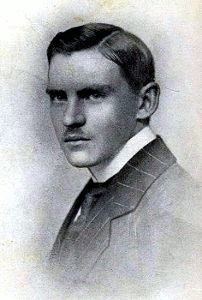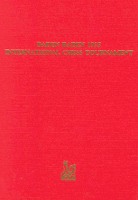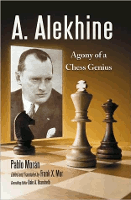by Anthony Gillam
The interview given below was published in Vechernee Vremja (Evening Times; Petrograd) on October 13th (26th) 1914 with a photograph of Alekhine. The interview was given to N. Sh-p or N-Sh-tz. (presumably a reporter with the newspaper). The chess corrrspondent of Novoe Vremja (of which Vechernee Vremja was the evening edition) was Julius Sosnitsky. In the copies of the latter which I have seen for 1914, there was no chess column but there were games from the St. Petersburg international tournament of April/May 1914. There was some competition between the Petrograd papers to publish the games quickly and the Novoe Vremja company held an advantage, having two newspapers per day. As we have already observed, Alekhine had considerable respect for Sosnitsky. Doubtless he also bore in mind that the readership in Russia was different to that in England and might include some better informed people, for example Saburov, and so a more accurate version was necessary. The first sentence on the interview indicates that it was given on Sunday, October 25th showing that Alekhine got in touch with the Petrograd chess community, or press, immediately upon his return, perhaps even earlier (by telegram).
Interview with Alekhine
The Misadventure of Russian Chess Players in Germany
(A Conversation with A. A. Alekhine)
Our famous chess player A. A. Alekhine arrived yesterday in Petrograd en route to Moscow having escaped from German captivity. Thinner, having suffered much and completely broken, the Maestro has not yet at this time recovered.
“It was a complete nightmare of horror, a terrible dream”, said A. A. Alekhine. “There can be no account, no description of the moral and physical suffering that I endured and that many of my colleagues, the Russian chess players, are still experiencing.
“The chess tournament in Mannheim began on July 5th [Old Style; 18th New Style], with the participation of an unprecedentedly large number of Russian players who honourably upheld their reputation. In the Master tournament I was in first place and it was likewise in the B tournament for the Kharkovite Rudnev. Rumors about political complications did not particularly worry us in Mannheim. All the same, on Saturday [presumably August 1st] we went to the Russian Consul Brosse, who warned us about the seriousness on the situation. But few believed him. Only Sosnitsky alone took into account the danger of the situation and departed. But on Saturday, an announcement awaited us that the tournament was suspended. For the payment of the cash prizes we had to wait until Monday.

The photograph of Alekhine that appeared with the article.
“On Sunday I went to Wiesbaden, wanting to visit my mother. In good spirits and intending to return to Mannheim I was suddenly arrested at the station at Wiesbaden. They led me to a separate room and interrogated me. They asked about the smallest details. Some of the questions bordered on the ridiculous. I was searched. But, to my surprise, I was not detained. I arrived in Mannheim at an hour past midnight. On the streets near the station there was an unusual demonstration. There was the sound of gunfire. It turned out that a French aeroplane had appeared over the Rhine. In fact, there was no aeroplane and the firing was opened up on the clouds.
“Somehow I got to the hotel and went to bed, but less than two hours later, a terrible knock awoke me. A detective entered my room and demanded in a rude manner that I immediately accompany him, not even allowing me to get properly dressed. I went to the police station. There I met several of the Russian chess players who had already been arrested, as well as the famous Janowski. We were put in a jail cell and some suspicious type joined us who listened carefully to what we said to each other. Only at 6 o’clock the next day the police chief appeared with a telegram and, summoning me, asked if I was an officer, adding that he had received a special telegram concerning me (as I later found out, the reason I was suspected of being an officer was that my portrait had been published in a German magazine where I was depicted in a Law School uniform).
“Accompanied by a detective I was taken into the street where a raging crowd built up very rapidly. My companion turned to me asking if I wanted to ride or walk, and added that we had quite far to go. We got on the tram. However, what depressed me greatly was the fact that the detective who accompanied me consoled me as though he even pitied me. After a journey of half an hour, he took me to a barracks, where he handed me over to some kind of officer. There I was pushed into a dungeon, where I spent 24 hours and was given the kind of food that a dog would not eat. Finally a colonel came and asked me who I was, and when he learned that I was a Russian chess player and a participant in the tournament at Mannheim, he declared to me that I was free.
“I returned to the city, where I met the liberated Russian chess players.
“However, we could no longer stay in the hotel where we lived. We, as Russians, were just kicked out. Not knowing what to do next, I went to the American Consul, who was very polite to me and went with me to another hotel, where he provided guarantees for us Russians. Here we spent the night, deciding that the next day we would do everything possible in order to get out of Germany. In the morning we went to make inquiries. To our misfortune, the protection of the interests of Russian subjects was transferred not to the American, but to the Spanish Consul, who comforted us with a message that hit us like a thunderbolt. He told us that he had received reports from Berlin that all the propertied Russians should go to Baden Baden, but that the poor ones would be sent into forced labour at Donaueschingen.
“At 6 o’clock we departed, seated somehow in third class. The train was crowded with soldiers, but we did not get to Baden Baden. The conductor, detecting that we were Russian, and wanting to make us happy [sarcasm], told us we had to make a transfer at Rastatt – an old military fortress. We went out on to the platform and were immediately surrounded by soldiers. We were told that we were under arrest. They lead us into a private room and searched us. Of course, they found nothing illegal. We were left with the impression that we would soon be released from arrest. Alas, our expectations were not realized. You can imagine how surprised we were when the soldiers were ordered to load their guns, and we were sent out in pairs on to the platform. Here nearly every one of us was put with two soldiers. We were ordered to raise our hands, despite the fact that each of us had our traveling bags and things in our hands. And so we set out. To proceed in this manner was downright impossible, and the crowd positively howled when they led us out on to the street. Both the officers and the soldiers shouted at us. Some of us could not keep our hands up and lowered them. Then the whole “cortège” came to a halt and they began to beat, with rifle butts and kicks, those who had lowered their hands. I personally received a blow like this on the back of the leg, which despite its blunt impact created a torn wound. It bled all night and even now I have a big scar on my leg. They sent us to a military prison where we were held for more than twenty-four hours. Here the soldiers cursed us terribly. They said that we were dangerous Russian spies, and that at any moment an order was expected that we were to be shot. Later, however, we were told that we were free from suspicion of espionage and they sent us to a civilian prison. We sat there for about two weeks. All our things were taken away from us. The treatment was horrible. They fed us worse than what is fed to dogs. We were forced to walk about the tiny courtyard, and we walked in line as in the arena of a circus. We were given over to the power of an insolent jailer, a retired soldier, who downright mocked us. Thus, there was the case that it seemed to him that I had smiled while out for a walk and for that I was taken away and placed in solitary confinement, where they kept me for three days. And he told me that he would hold me there as long as he wanted. The most curious thing is that when we were released out of this terrible dungeon, they demanded payment of bills for food of no more, and no less, than 300 Marks. They handed us over to a gendarme and we were sent to Baden Baden, where they again interrogated us in minute detail, but to our common joy they also allowed us to live in a hotel under police surveillance. Here we spent four and a half weeks. The strictness in relation to us was downright unbearable. For example, I was fined five marks because of the fact that I was sitting at the hotel and playing chess while talking loudly and laughing at an open window which “disturbed” the peace.
“A fortnightly publication in Baden Baden called for a pogrom of Russians, pointing to the fact that very many of them were gathered in Baden Baden. The newspapers demanded that all Russians be sent to East Prussia to drain marshland. The impudence of the Germans reached the point that flags, which decorated the city on the days of victories reported by the helpful [sarcasm] Wolff Agency, were hung out from the windows of our rooms.
“In the end there came an order to release the women and children and persons not subject to conscription. The sick were assigned to a medical examination for which I prepared by refusing to eat for several days. I managed to convince the doctor that I was near death, and I got long-awaited permission to travel to Switzerland. As far as I know, out of the ten Russian players only two more have been released: P.P. Saburov and F.P. Bohatyrchuk from Kiev.
“I spent 20 hours on the journey from Baden-Baden to Schaffhausen, from there I went to Genoa, to Nice, Marseilles, Paris, Boulogne, London, Liverpool, Chistiania, Stockholm, Rauma and arrived safely in Petrograd, having been in transit for three weeks.* The mood in France, especially in Marseilles, was in all respects cheerful. Life was in full swing. We Russians were met there with open arms. Nor can I remain silent about the exceedingly kind attitude at the Russian embassies in Paris and London, where I was even loaned money. Today I am going to Moscow with the intention of never again in my life going to a country where I should have to endure so much suffering and hardship.”
N. Sh-p or N. Sh-tz [the original is too blurred to read with certainty]
*Alekhine says he was in Baden Baden for four and a half weeks. We know he was there from August 15th to September 14th or 15th which is 31 or 32 days, precisely correct. If we assume that he was just as precise when he said that his journey back home took three weeks, and we know this must refer to his journey from Genoa to St. Petersburg, then we can calculate backwards from October 24th and arrive at October 3rd or 4th for the day he left Genoa. Bohatyrchuk implies that he left after Alekhine and Saburov and we know that a suitable ship left Genoa for Odessa on October 5th. The Cavour left Genoa for Buenos Aires on October 3rd. Having decided his contest with Capablanca was no longer possible (perhaps he had an answer to a telegram), Alekhine could have left Genoa on October 3rd or 4th.
This version leaves out the passport incident and the warden’s daughter, but otherwise conforms very well to the other versions that we have seen. Schaffhausen is on a direct railway line from Baden Baden to Switzerland and is the first town across the border. We have seen it reported that he travelled via Basel and Zurich but it is unlikely that he visited both. He probably continued by rail from Schaffhausen to Zurich. There are still some unanswered questions about his journey.
Below we present a blindfold game from the book:
Bogoljubow,E – Alekhine,A [C40]
Police Station, Mannheim 1914
1.d4 Nf6 2.Nf3 d5 3.Bg5
3.c4 is stronger, followed by Nc3.
3…Ne4! 4.Bh4 g6 5.e3 Bg7 6.c4
Perhaps 6.c3, followed by Bd3, is better.
6…c5 7.Nc3 cxd4 8.Nxe4 dxe4 9.Nxd4 Qb6 10.Qd2 Nc6 11.Nxc6 bxc6 12.Rb1 Bg4 13.b4?
13.Be2! was necessary. Now, with his next move, Black achieves a decisive advantage.
13…Rd8!
![[FEN "3rk2r/p3ppbp/1qp3p1/8/1PP1p1bB/4P3/P2Q1PPP/1R2KB1R w Kk - 0 14"]](https://chesscafe.com/wp-content/uploads/2014/08/skittles457a.gif)
[FEN “3rk2r/p3ppbp/1qp3p1/8/1PP1p1bB/4P3/P2Q1PPP/1R2KB1R w Kk – 0 14”]
White has nothing better. After 14.c5 Rxd2 15.cxb6 Bc3!, the game is over.
14…Qxb4+! 15.Rxb4 Bc3+ 16.Qxc3 Rd1# 0-1
The game which is given above seems to be a previously unknown Alekhine game which was published in De Telegraaf as late as November 21st 1940! A cutting was found in a Schelfhout scrapbook at the Royal Dutch Library. From the information on the cutting, we have allocated this game to the players’ first imprisonment rather than to Rastatt. So it seems these two players first began their double blindfold games in Mannheim, not in Rastatt.
Order Mannheim 1914 and the Interned Russians
by Anthony Gillam


Leave a Reply